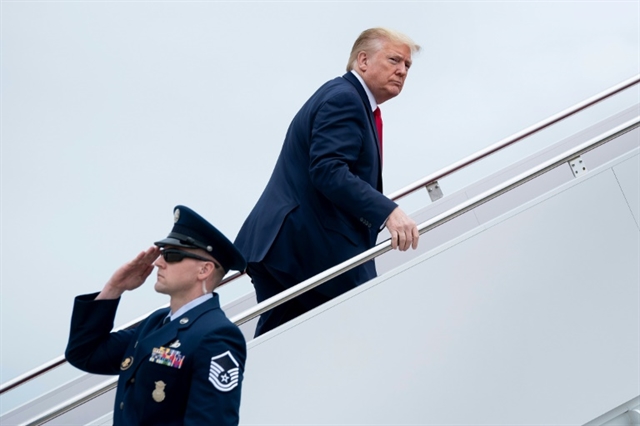 World
World


|
| President Donald Trump said he will pull the United States out of the Open Skies Treaty with Russia, accusing Moscow of breaking its commitments under the defense pact. —AFP/VNA Photo |
WASHINGTON — President Donald Trump announced on Thursday he plans to withdraw the United States from the Open Skies Treaty with Russia, the third arms control pact Trump has abrogated since coming to office.
The US leader said Moscow had not stuck to its commitments under the 18-year-old pact, which was designed to improve military transparency and confidence between the superpowers.
"Russia did not adhere to the treaty," Trump told reporters at the White House.
"So until they adhere, we will pull out."
Ambassadors to NATO, whose members are also party to the treaty, called an urgent meeting on Friday to assess the consequences of the move, which could impact European security.
Germany's Foreign Minister Heiko Maas urged Washington to reconsider, saying that Germany, France, Poland and Britain had repeatedly explained to the US that the problems with the Russians in recent years "did not justify" pulling out.
The treaty "contributes to security and peace in almost all of the northern hemisphere," Maas said.
"We will continue implementing the treaty and do everything to preserve it."
US Secretary of State Mike Pompeo said Trump would formally notify the parties to the treaty on Friday of US plans to withdraw, which will start a six-month countdown to pullout.
"Effective six months from tomorrow, the United States will no longer be a party to the Treaty," Pompeo said in a statement.
"We may, however, reconsider our withdrawal should Russia return to full compliance with the Treaty."
The Open Skies agreement permits each signatory country's military to conduct a certain number of surveillance flights over another member country each year on short notice.
The aircraft can survey the territory below, collecting information and pictures of military installations and activities.
Including Russia and the United States, the treaty has 35 signatories, though one, Kyrgyzstan, has not yet ratified it.
The idea is that the more rival militaries know about each other, the smaller the chance of conflict.
But the flights are also used to examine vulnerabilities of the other side.
Russia’s feedback
There is no reason for Russia to remain a party to the Open Skies Treaty after the US withdrawal since this gives Washington an advantage in obtaining data on Russia’s Armed Forces, Deputy Director of the Centre for Comprehensive European and International Studies at the Higher School of Economics National Research University and expert at the Valdai International Discussion Club Dmitry Suslov told TASS.
"It is not advisable for Russia to keep its own participation in the agreement after the United States pulls out of this agreement, because European countries of NATO within the framework of this agreement will still be able to fly over Russian soil," Suslov said.
"If Russia remains a party to the agreement, the zero-sum game will go on, because the United States will continue receiving information on the state and deployment of the Russian Armed Forces from its European allies in NATO remaining in the agreement, while Russian planes will not be able to fly over the United States. Certainly, Russia will not receive relevant information about the US army from the Europeans. "
According to the expert, the US decision on the withdrawal from the treaty would further escalate military and political situation in the Euro-Atlantic region and worsen ties between Russia and NATO.
"The Open Skies Treaty was one of a few remaining elements of ensuring predictability and transparency," Suslov said. "Under this deal, the parties were able to perform flights and receive trustworthy information on the state and deployment of each other’s forces."
The US withdrawal from the treaty is part and parcel of Washington’s policy towards gaining more freedom in actions on the international arena, according to the expert. The Republicans treat rather negatively all deals limiting US freedom in the military field. This policy of the Republicans was formed in the mid-1990s and now amid confrontation with China and Russia this idea only consolidated.
"In the US, at least among the establishment within the Republican party, the idea prevails that any limiting agreements prevent the US from stepping up its might for defeating Russia and China. In order to gain victory in new conformation, they need to untie their hands at maximum," the expert noted.
The US is not hiding that it uses the threat of an arms race as an element of pressure on Moscow and Beijing. "If a new arms race begins, it will end for Russia like for the Soviet Union, as the Americans think, and Russia will be exhausted, will lose its blood and will collapse."— AFP/TASS




